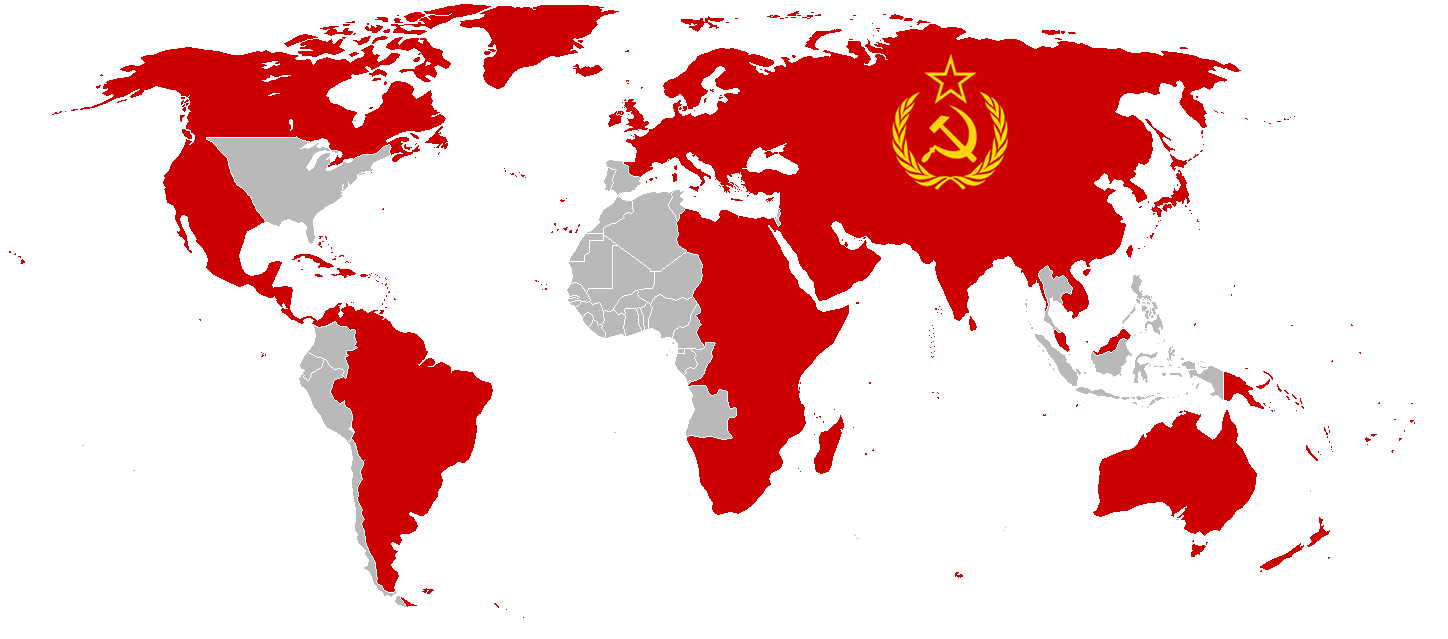In short: By the time a person is 18, they must effectively be able to communicate and understand conversationally in 2 languages and casually use them in daily life..., if not become completely fluent...
Other than that, any language goes (whether it is a locally-known one, or a popular one worldwide),
The only thing I hope to gain from this, is to rid the world of /Monolingual Betas/
Seriously though, has this been a policy before? Because I haven't heard of such one...
I think this can especially be used for citizenship...
Edit: I don't necessarily have any other presupposed requirements besides bilingualism, though we may have certain notions of such in this main goal
Edit II: In furthering this venture, I have realized that my liberalism may slightly poisoned my lens....
And for clarification...
Minimum dual language system:
Main national language + other language (likely another related language, but foreign ones are fine)
Counterpoint: Like 80% of bilinguals in Latin America (myself included) have American culture brainrot as a result of being able to go on anglo internet.
Synthesis: Mandatory bilingual policy, the English language is officially forbidden.
Mandatory bilingual policy, the English language is officially forbidden.
Show
But if you can understand the enemy, you can understand how to get into its beating heart...
That being said, it's not necessarily a bilingual problem than a Western cultural one, eh?
It would be so handy to communicate with someone from the other side of a window or something too
I expect everyone would develop a habit of signing some things while talking, to emphasize a point or provide context.
And where does this slope end? We all have to learn how to speak to neurodivergent people in an inclusive way because neurotipical communication can lead to misunderstanding???


Why? I’m thinking in terms of what I would use as a language in my every day in the United States and there are so many languages I hear more often per day than see people signing
In the post-atomic horror of the near future you will need sign language to signal your comrades while you engage in urban stealth combat against the techno-barbarians of the rad wastes
A bizarre combination of Drake and BTS lyrics, they're a barbarous people
To communicate with deaf or hard of hearing people, to communicate with someone when you both can't hear eachother, to commicate with infants, to committed with non verbal people, etc but just communicating with disabled people should be a good enough reason
But why this over a language with more monolingual/ non-dominant language speakers within the country? You can’t communicate with them either unless you know their language
I feel like this would just end with kids in poor school districts not being able to become citizens
Actually you might be able to get white support for that lmfao
They don't have to speak perfectly in a language, they just have to communicate well and use it in daily life...
Note: Besides, what are these white people going to speak as a second language? Scots?
Canada already has the results of your thought experiment though, outside of people who work in Quebec tourist towns the only ones who can communicate well in both languages either went to private school or an immersion program. The latter are very much similar to gifted programs in that they are very much designed as a way to get additional public funds to affluent people who can't quite afford private school tuition.
Well, I guess that answers my question...
Edit: But I think its more of a socio-economic systemic problem than a policy one, in regards to bilingual policy...
I wish, I feel so inadequate being an American who only knows one language comparing myself to...Almost every other country in the world lol. If I ever have a kid I would insist that they start school taking language immersion classes if it were available
Something something, I remembered a Latino joke how if a "Multilingual" refers to someone who speaks 3 or more languages, then "American" refers to someone who can only speak one...
Man, us Americans get owned so hard by people in other countries when it comes to roasting. I've heard that in Europe people will threaten to sue eachother as a joke on Americans lol.
I think a large part of why people in the anglo sphere only speak one language is that the school system doesn't do a great job of teaching it
I remember my french teacher would call us ignorant bigots for not speaking french - it's like you literally only taught us the word for pen
saying people must be bilingual is like saying people must be literate. Everyone agrees it would be a good thing to be bilingual but not everyone is educated in speaking multiple languages. I also think there is an element of classism in looking down on the monolingual as unless they come from a bilingual household the only bilingual people I've known had recieved private education for it
I personally would love to speak a second language but it wasn't something I was given the opportunity for as a child and learning one as an adult is hard work
Oh ... I haven't exactly considered it, ok... I stand by my point, but yeah, I think people have to grasp the language through natural exposure rather than rely necessarily on the school system... besides, I believe bilingualism, with enough state support, can help open economic and social opportunities and cultural bonds as well.
Key word though: 'enough state support' (Austerity would have a word with that)...
but yeah, I think people have to grasp the language through natural exposure rather than rely necessarily on the school system
well that's nice but it's also not cheap. Going to live in another country to pick up the language is not something that a lot of people can just do
it very much does seem here that you are looking down on people for not knowing what they were never educated to know. You can live a full life only exposed to English there just isn't any real exposure to other languages. Hell even when you speak to foreigners they all want to practice their English
Yeah, I'll admit, I look down upon those who know only one language, I guess it's the fact that I have the zeal of a convert, (as a previous one), so I apologize for my harshness
Just for context and clarification, we're in the post-Industrial Globalized era, specifically one defined by multipolarity yet crises, and I guess during such times, bilingualism during this time feels more like a necessity, when our economies and societies feel more interconnected than usual and communication is quite important
Hell even when you speak to foreigners they all want to practice their English
I think you're proving my point, I mean, for example, in my city, there seems to be a lot more Middle-Eastern, South Asian, and East Asian migrants who speak English yet still retain a bit of their native tongue...
That being said, if you want open yourself up more to the world, learning just a 2nd language is one of those keys...
Just for context and clarification, we're in the post-Industrial Globalized era, specifically one defined by multipolarity yet crises, and I guess during such times, bilingualism during this time feels more like a necessity, when our economies and societies feel more interconnected than usual and communication is quite important
well we are and we aren't. A lot of major corporations insist on doing all international business in English and most people aren't travelling the world and will just work in the one country where they have roots and where their job is
Being bilingual would be good but it's hardly a necessity
 has this but the two languages are extremely cursed. In practice most areas treat the French language requirements as a joke.
has this but the two languages are extremely cursed. In practice most areas treat the French language requirements as a joke.All of Canada treats the French requirements as a joke, Quebec treats speaking English as equivalent to genocide

Quebec genuinely cares more about the language than the french - by a lot
Crackers are so desperate to be oppressed that this is the closest thing they have
A Quebecois socialist (or at least someone belonging to a nominally socialist party) once wrote a book called, translated to English: White [N-words] Of America, trying to paint Quebec's "struggle" for independence and acceptance as being the same as the black civil rights movement in the US

I agree, the fact that Spanish isn't mandatory from pre-school in the states is a fucking crime. Bilingualism is only a good thing, and there is so much cultural experience you miss out on by not speaking Spanish while living the Americas.
Maybe it's not learned great by everyone, but only by learning a bit will people start to learn how many more opportunities there are when you know two languages, and the drive to know more and more will come.
Agreed, though whatever language you may want to learn may depend on your mileage (eg. region, preferences etc.)
Data here is a few years old, but in most places in the EU, more people can speak at least one additional language than not.
https://jakubmarian.com/average-number-of-languages-spoken-by-the-eu-population/
I'd wager a big part of it is due to the legacy of colonialism, where in the Anglosphere there are so many people in every direction that speak the same language that there isn't the same incentive to learn another. Whereas, for most of human history, people have needed to learn additional languages, and often stay accustomed to learning new ones.
A conjecture you could make is that for any country where over 90% of people speak the primary language, then the more populous the country, the less likely people are to be bilingual. This explains Japan, and perhaps also Russia and large parts of Latin America.
An example on how some people didn't necessarily were forced arbitrarily, is when many people in Europe go on Erasmus (a government sponsored exchange program) and spend a year in another European country where they spend 90% of their time communicating in the local language
As I said, besides the billingualism, the choices and rules are loose and many.
That being said, I can understand your concern with the term "mandatory" giving a restrictive connotation...
Even taking your logic, I'm pretty sure in this world, you are more likely to have 2 parents that each speak a different language than 2 parents who can't...
Plus, you don't need interested parents to realize that you'll eventually have to deal with a more multipolar world, most of whoms' people won't speak the same language fluently as you, so it's good, not only for practical but social needs, to probably do this...
Finally, a little bit of societal pressure and a loose law (read again my post) didn't stop the Anglophonie from having children, not only including their own but other migrants, from learning English to integrate...
For me, it should be easier than a minimum wage increase, if it's to be implemented overtime....
Come on, what about the Nordic countries and the Nederlands, as well? Besides their own respective languages, due to similar Germanic roots of their language and their need to interact with the Western world, I bet many of them speak English...
https://www.wordspath.com/english-speaking-countries-in-europe/
yes but for that to be relevant it would have to be local. If everyone in Norway speaks multiple languages that won't help you if you come from an area where everyone is monolingual.
Ok, honestly, I should've took that in account...
I'll be shocked if burgerland isn't the only country in the global north where people only speak one language.
Typical American exceptionalism, acting like the UK isn't just as stuck up about English.
I would count them, foreign language classes (so basically English) are mandatory in Japanese schools, but I doubt many Japanese people speak other languages well.
I'd love to have some actual data for this, but searching mostly just brings up results for the Japanese language test for foreigners.
From anecdotal experience being in Japan, it's very rare to meet someone who can casually communicate in English unless it's part of their job or they've studied abroad. English in schools is mandatory as a class, but it only seems enough to remember basic phrases rather than imparting full fluency. I'd compare it to how Americans in high school will often study Spanish or French, then remember none of it.
That’s because memorizing a dictionary isn’t the same thing as learning a language, and memorizing a thousand different grammatical rules doesn’t really help you at all. You’re basically translating every time you speak the other language and spend half your mental faculties trying to figure out how the words go together. There’s no intuitiveness.
It’s an exhausting way to learn and at the end of the day the best case scenario is you’re a walking dictionary. Obviously you can’t remember all of that forever if you’re not constantly using it.
The vast majority of American language classes is just rote memorization.
Spanish and Mandarin only.
We can make exceptions given the proper forms, but absolutely no English under any circumstances.
Salamat sa Dios, dahil aking wikang hiniram ilang mga salita sa Espanyol...
Hirap pa though, ganyan siguro bakit ako gamitin Tagles (Taglish)... maraming beses...
Pero sinubukan ako, anuman yan, hindi ba?
I can't interpret what you're saying without a translator except for 4-6 words, but I recognize enough to conclude that it is very normal for someone saying that to have the idea/worldview/assumptions/values expressed in the OP.
But I mean that in a positive light.
If you speak or write Tagalog then you are familiar with being in a country that has multiple regional languages, so being multilingual is quite normal for you.
The thing is I'm a migrant to UAE, so I haven't been as exposed as much to it... let alone the other languages.... but it's familiar to me via my parents...
I think everyone should learn esperanto or some made up languange as a second language so that you can communicate with anyone in the world no matter what country they come from.
Idk ... in my opinion, naturally-developed languages are the basis to go, but alr then...
Maybe 100 years from now we'll have the global coordination needed to make stuff like that a reality.
Until then, I think it's a lot more useful to have "regional languages". Between Arabic, Persian, Turkish, Mandarin, Hindi, and Malay, over 3/4 of Asia speaks one of these, and roughly half of Asia speaks one of them natively. Add Japanese, Vietnamese, and Thai, and you reach perhaps 90% L1 or L2. Interestingly enough, only 2 of these 9 languages share a language family.
4 languages make up >95% of the L1s in the Western Hemisphere, and these carry over to Africa to make up probably at least 60% of people at L2.
Perhaps a controversial position would be that groups of endangered or smaller languages could maintain a better guaranteed existence by coalescing around one of them as a lingua franca, and possibly having better prospects of outsiders learning that language too.
somehow klanada passes this bar with their mandatory french requirements...
I feel like French doesn't necessarily have to be mandatory. Just take one mandatory language, and an optional one....
Simple, Fr*nch is redefined as a dialect so it doesn’t count as a language
Ok but if we're using the US system to teach languages then no one is actually going to learn a language. People take "four years of Spanish" in high school and even claim that they "know Spanish' yet they probably couldn't even understand simple conversations or watch some super slow kid's show like Dora the Explorer. I mean think about it, they engage with the language like at most 5 hours a week during class and maybe 5 hours more for homework (which I highly doubt). That's nothing in the grand scheme of things when learning another lanuguage. You need hundreds, if not thousands of hours engaging with the language to become fluent.
The problem with high school language classes is that the only thing they actually teach is memorization. They know how to read “the apple is red” but switch the words around and they’re totally lost.
Whole classes are basically just the teacher writing “gusta = like” on the board. You didn’t learn Spanish, you learned a less efficient version of machine translation.
The only solution I'd suppose is that we learn another language like you did learn English as a baby,
(eg. natural exposure to its sound, word order, and vocab context & tutoring by its native speakers)
(Copied and pasted a bit for clarity and explanation)
In high school all our language classes were basically electives, something I was able to get out of for some reason I don't remember anymore, but I had come from a different district where second languages didn't start until high school so in 8th grade being shoved into a 2nd year Spanish class was a joke. Got placed in remedial Spanish and booted from the advanced classes as a result, absolutely failed learning Spanish. Hated the Spanish language as a result because I just couldn't learn it. In like 10th grade I started teaching myself Japanese and combined it with just memorizing a bunch of vocabulary, learning the rules of the language, and a shitload of exposure to listening. Intentionally found kids shows in Japanese to watch just so I'd have more exposure to easier parts. Did pretty well and was at conversational level in 2 years. Now as an adult I don't have the time to keep trying to learn and the time I can dedicate to exposure is a lot lower, but a single year in Japan probably tripled my proficiency from conversational in my last year of high school. Accent was comparatively milder compared to my peers too. I also feel like I don't have to take the step of translating it in my head to understand and when I do put time in I just use Japanese tools rather than English tools.


















